|
 |
|
Talking Points
Winter Holidays 2016 |
Resending - apologies. Dear Zhenying:
Unpredictability is the new watchword in U.S.-China relations. Whether it is maneuvering in the South China Sea, direct talks between Taiwan's president and America's, China's imposition of tighter foreign exchange controls or the U.S. blocking of the sale of a German firm to China, the past two weeks have offered much to think and talk about.
For ten years now, the USC U.S.-China Institute has helped inform public discussion of what's important in the U.S.-China relationship and what is changing. We've done this through our conferences and
public talks, through our documentaries and web magazines, through the faculty and student research we've sponsored, and through professional development programs for teachers and others. We've done this through our web calendar and Talking Points newsletter. Where else can you find a comprehensive continent-wide listing of events and exhibitions relating to China? Journalists and others routinely draw on the research of institute-affiliated experts or look to them for informed commentary.
All of these efforts take money. We need your help if we are to continue. So please consider supporting the institute with a tax deductible contribution. Gifts of any size are both needed and appreciated. It is quick and easy to donate via the secure USC server, via check, or via wire transfer:SUPPORT USCI.
Please act now if you believe that timely, reliable, and research-driven information about today's China and about the U.S.-China relationship is essential. A new U.S. president will soon assume office and in fall 2017, China's Communist Party will assemble to determine who will lead China for the next five years. Major economic, security, and other policies are in flux. Please support the USC U.S.-China Institute so that we can continue to foster a fuller, deeper, and more nuanced understanding of the 21st century's most crucial relationship.
*****
In our next issue, Talking Points examines myths and realities of U.S.-China trade. Now, though, we note President-elect Donald Trump's choice of Iowa Governor Terry Branstad to be the next U.S. ambassador to China.
Governor Branstad's nomination got a lot of attention because it is an important post and because it preceded Trump's choice of Exxon chief Rex Tillerson as Secretary of State. Much of the press attention on Branstad focused on the fact that he briefly met Xi Jinping when he was a member of a delegation that visited Iowa in 1985. A Chinese Foreign Ministry spokesman greeted rumors of the choice with the observation that "Branstad is an old friend of China."
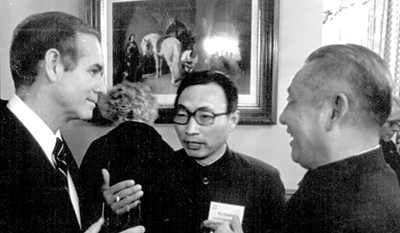
1980:Iowa Gov. Robert Ray and Guangdong Gov. Xi Zhongxun(right). No Western suits among Chinese visitors.(Des Moines Register photo) |
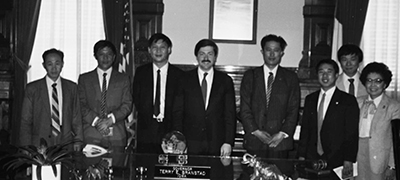
1985:Hebei delegation, including Xi Jinping(third from left), visits Iowa Gov. Terry Branstad(center) |
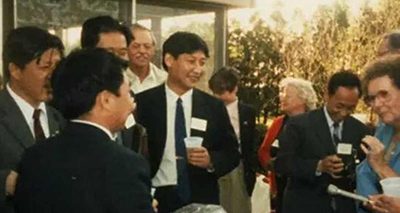
Hebei delegation relaxing with Muscatine, Iowa hosts. |
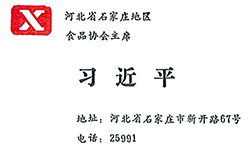
Xi Jinping's business card. No postal code, internationally-accessible phone number, email address, and definitely no WeChat QR code. |
Branstad and his predecessor Robert Ray started pursuing Chinese trade not long after the U.S. and China established formal diplomatic relations. Ray visited China in 1979 and 1980 and hosted a visit that included Xi Jinping's father Xi Zhongxun in 1980. When Branstad moved from lieutenant governor in 1983 to the top job, he agreed to make Hebei Province Iowa's official Sister State. In 1984, Branstad took forty-five Iowans with him on a trade mission to Hebei and in 1985, the province sent a handful of officials, including Xi Jinping, to Iowa. In part to save money, the Iowa Sister State committee put the visitors up in the homes of cooperative citizens. The visitors loved this, the barbeques, and more. Xi Jinping was party secretary of Zhengding County 正定县. His business card, now on display in a museum commemorating the visit identifies him as chair of the regional food products association.
In 2007, Xi was elevated to the Communist Party Politburo Standing Committee and in 2008 he was made vice president. Iowa opened a trade office in Beijing in 2008. Branstad had opened one in Hong Kong in 1985. In 2011, Branstad(again governor after a few years as a university president)met with Xi in Beijing and invited him to return to Iowa. Xi Jinping took him up on the offer in 2012, revisiting his Muscatine host family as well as the Kimberley family farm. He told the Kimberleys that he wants to replicate the farm in China. He was impressed by the use of technology, including grid sampling of soils, using GPS for planting and harvests, and hybrid seeds.
In subsequent visits and in meetings with Chinese visitors, Branstad has continued to work to promote Chinese imports of Iowan products. According to the U.S. government, China bought about $2.5 billion in goods and services from Iowa in 2015, ranking as the state's third largest export market. China accounted for about 9% of Iowa's total exports. Corn, tractors, and brewing waste were the top exports.(By comparison, California exported over $20 billion and Washington exported over $16 billion in goods and services to China in 2015.)
Branstad's most recent trip was a week after this year's election. This time he was pushing Chinese and Japanese to buy Iowa's pork and beef. Japan is Iowa's most important market for meat products, but in September China reopened its beef market to American exports. For thirteen years, U.S. beef was kept out owing to fears over mad cow disease. Officials and exporters hope that American beef can win Chinese market share away from Australia and Brazil. Beef consumption in China has risen quickly and imports have doubled since 2013.
But it isn't just that Branstad has worked to promote his state in China that caught the president-elect's eye. The governor criticized Trump's December statement that the U.S. should temporarily ban Muslims from entering the country. He said America needed someone with experience and a bit of nuance as president. By January, though, Branstad was impressed by the crowds Trump was getting in the state, noting that Trump was giving voice to the dissatisfaction many felt. Branstad formally endorsed Trump in May. On November 6, just before the election, six-time governor Branstad joined Trump at a Sioux City rally and Trump said, "you would be our prime candidate to take care of China."
It was during his "thank you" rally in Des Moines on Dec. 8 that Trump formally announced Branstad as his choice.
One of the China-Iowa stories that wasn't highlighted in discussions of Branstad's nomination was the conviction this year of Mo Hailong, a Chinese citizen, of trying to steal high-yield, pest resistant bio-engineered cord seeds. Mo worked for Dabeinong Technology Group. His sister is married to the billionaire head of the firm. Mo was convicted of sending hundreds of kilograms of seed to China where they were counterfeited. Mo was confronted in a DuPont Pioneer research field near Tama, Iowa in May 2011. He fled, but was soon under a FBI microscope. He was subsequently monitored acquiring seeds by pretending to be a grower, visiting other research facilities, trying to ship seeds to Hong Kong, and stealing corn from research fields. He was arrested and charged with theft of $30-40 million worth of bioengineering secrets. Charges against Mo's sister were dismissed and his other alleged co-conspirators had already left the U.S. Mo pled guilty in January and in October was sentenced to three years in prison. He is also supposed to pay restitution.
Weak Chinese enforcement of intellectual property rights will be among the issues that Branstad must deal with, assuming he's confirmed by the Senate to replace Max Baucus as America's chief representative to China.
*****
Baucus and now Branstad join other political veterans sent to Beijing. The first head of the U.S. liaison office was George H.W. Bush. He had served Richard Nixon as ambassador to the United Nations during the time that the People's Republic replaced the Republic of China(Taiwan)in the UN and on the Security Council and he had chaired the Republican National Committee before President Gerald Ford sent him to Beijing. Thomas Gates, Jr.(a former Secretary of Defense)and Leonard Woodcock(a former head of the United Auto Workers)succeeded Bush at the liaison office. Midway through Woodcock's four years in Beijing, President Jimmy Carter and Deng Xiaoping agreed on formal diplomatic recognition, a process that included severing official ties with Taipei, a process that Donald Trump's phone conversation with Taiwan's President Tsai Ing-wen last week brought back into the news.
For the next fifteen years in the 1980s and 1990s, veteran diplomats with a China focus served as the American ambassador to China. This included Arthur Hummel Jr.(1981-85)who was born in China to missionary educators(and whose uncle William taught at the University of Nanjing and USC). Winston Lord(1985-89)was an assistant of Henry Kissinger's and had been part of the 1971-72 rapprochement with Beijing. Jim Lilley(1989-91)was born in China and spent the first dozen years of his life there. He joined the army and then the CIA, becoming the top China specialist there by 1975. Before serving as ambassador in Beijing, he had served in the liaison office there, had headed America's unofficial office in Taiwan and was ambassador to South Korea. He had close ties to the man who appointed him, George H.W. Bush, who had headed the liaison office while he was there and was also a former director of the CIA. Like Hummel and Lilley, J. Stapleton Roy(1991-96)( 2007, 2014 talks)was born in China. He had served at the liaison office and embassy for three years before serving as ambassador to Singapore and Deputy Assistant Secretary for East Asian and Pacific Affairs.
Since Roy, America's chief representatives have included political veterans such as Jim Sasser(1996-99), a three-term senator and friend of Vice President Al Gore, and the former head of the U.S. Pacific Command, Admiral Joseph Prueher(1999-2001). Prueher was in Beijing when one of the first U.S.-China dust-ups in the South China Sea took place. On April 1, 2001, a U.S. Navy reconnaissance plane was intercepted by Chinese fighter jets in international air space off China's southern coast. The resulting collision killed the Chinese pilot and forced the U.S. crew to make an emergency landing in China. The stand-off was eventually diffused, though disagreements persist between the U.S. and China over what activities are permitted outside a nation's territorial waters and air space. The latest incident took place Thursday when the Chinese navy seized a U.S. naval underwater drone as it was being collected off the coast of the Philippines.
Prueher was replaced by Clark "Sandy" Randt. Randt was a college buddy of President George W. Bush and was a veteran China-focused attorney. He wound up becoming America's longest serving ambassador to China(2001-2009). He was succeeded by Jon Huntsman, Jr.(2009-11), Utah's governor and a former diplomat and trade official. The Republican had been a missionary to Taiwan and spoke Chinese. As his successor, President Barack Obama appointed Gary Locke(2011-14), the first Chinese American to serve as ambassador to China. Locke had served two terms as governor of Washington and was Obama's first Secretary of Commerce, working to expand U.S. exports to China and elsewhere. Chinese remember him for carrying his own bag and buying his own coffee and for broadcasting the air pollution readings taken from the embassy roof. When Locke stepped down in 2014, Obama chose Max Baucus. Prior to this, Baucus had represented Montana in Washington for almost forty-years, including six terms as a senator. Baucus had long pushed for stronger trade ties with China and had supported China's entry into the World Trade Organization, the fifteenth anniversary of which was this past week. *****
The U.S. relationship with China is multifaceted and evolving. There are many issues that the new ambassador understand well, but others that he'll need to study. President-elect Trump has said that he likes the idea of America being less predictable in the international arena. Many in the security, diplomatic, and business spheres fear just that.
Branstad, too, will take office in a new era where the top U.S. and Chinese leaders meet frequently as part of strategic dialogues and on the sidelines of multilateral gatherings. President Obama's first meeting with then Chinese President Hu Jintao was at the G-20 Meeting in London in April 2009. His last meetings with President Xi were at the G-20 Meeting in Hangzhou in September and at the APEC Meeting in Peru in November.
*****
Thank you for reading Talking Points. Please share it with friends and colleagues and encourage them to subscribe. We'd love to hear from you. You can reach us via email or via Facebook or Twitter. Please support the USC U.S.-China Institute with a tax-deductible donation. We are eager to continue our efforts to inform public discussion of the multi-threaded and always changing U.S.-China relationship. We need your help.
Best wishes,
The USC U.S.-China Institute
-- a program of the Annenberg School for Communication and Journalism
Donate to USCI via the USC secure server:
Click here to subscribe to Talking Points. Keep us out of your spam/promotion folder - add uschina@usc.edu to your address book.
January 26, 2017 - 4:00pm
Los Angeles, California
The USC U.S.-China Institute presents a book talk by Terry Lautz to examine the life of John Birch, an American missionary and military intelligence officer in China during WWII. He was killed in a dispute with Chinese Communist soldiers and later became the namesake of the controversial right-wing John Birch Society.
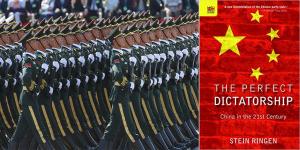 March 2, 2017 - 4:00pm Los Angeles, California
Please join the USC U.S.-China Institute for a book talk by Stein Ringen. In "The Perfect Dictatorship:China in the 21st Century," Stein examines how China's distinctive governmental system works and where it may be moving.
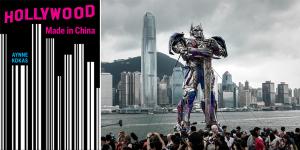 March 9, 2017 - 4:00pm Los Angeles, California
The USC U.S.-China Institute presents a talk by Aynne Kokas from the University of Virginia. Kokas' new book, "Hollywood Made in China," offers an in-depth look at China's growing role in the global media industries and how it is shaping Hollywood in the twenty-first century. |
|
Upcoming USCI Events
John Birch, China, and the Politics of Conspiracy
January 26, 2017 - 4:00pm
Los Angeles, California
The USC U.S.-China Institute presents a book talk by Terry Lautz to examine the life of John Birch, an American missionary and military intelligence officer in China during WWII. He was killed in a dispute with Chinese Communist soldiers and later became the namesake of the controversial right-wing John Birch Society.
March 2, 2017 - 4:00pm
Los Angeles, California
Please join the USC U.S.-China Institute for a book talk by Stein Ringen. In "The Perfect Dictatorship:China in the 21st Century," Stein examines how China's distinctive governmental system works and where it may be moving.
March 9, 2017 - 4:00pm
Los Angeles, California
The USC U.S.-China Institute presents a talk by Aynne Kokas from the University of Virginia. Kokas' new book, "Hollywood Made in China," offers an in-depth look at China's growing role in the global media industries and how it is shaping Hollywood in the twenty-first century.
|
|
| | |
Happy Thanksgiving! 感恩节快乐!
We have much to be thankful for, including the many of you who attend our events, read our newsletter and web magazine, or watch or documentaries and presentations online. We're grateful for the many partners who aid us in our efforts to inform public discussion about the U.S.-China relationship. Some of these are institutional backers, such as the Freeman Foundation which underwrites our teacher training program, and others are individual donors whose gifts, large and small, make the institute's work possible. Each of you is essential to our efforts. Thank you.
Some previous Thanksgiving editions of Talking Points have featured Thanksgiving-themed recipes developed by noted Chinese American chefs. If you're still figuring out what to make tomorrow, you may appreciate these suggestions from Sylvia Wu(click here for an article/photos from her 100th birthday), Ming Tsai, and Martin Yan.
|
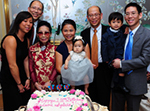
|

|
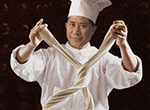
|
|
Madame Wu and family(Palisades Post) |
Ming Tsai with his mother, Iris |
Martin Yan |
This year, Eastday, a state-owned Shanghai news website, has come up with a "Thanksgiving with Chinese characteristics menu." Reporter Bao Yongting writes that the adjustments for Chinese stomachs begin with the bird. The turkey is a monster, she notes, to be filled with various things. Turkeys, though, are hard to come by in China and even though it's hard to match the fragrance of a roasted turkey, Bao suggests a lemon chicken option with a vegetable stuffing. Pumpkin pie is replaced with pumpkin rice balls shaped like little pumpkins. Instead of cranberry sauce, Bao's got a hawthorn sauce. Sounds tasty, right? Enjoy these photos and click here to give the recipes a try.
Back in 2011, we noted the rise in turkey consumption in China, including the establishment of a U.S.-style gourmet turkey restaurant in Beijing and the enduring popularity in Taiwan of Chiayi turkey rice(嘉義鶏肉飯). Chiayi turkey rice is still going strong, but Dianping, a restaurant review site, reports that the Beijing restaurant is
no more. China is now America's second largest export market for turkey. That 2011 Talking Points also noted, however, that Chinese were getting into raising turkeys. Earlier this year an article from the "China Chicken and Egg" website sought to encourage Chinese poultry farmers to raise the birds, arguing that the meat is nutritious, that the profit potential was great, and noting that the Ministry of Agriculture had included it in its "China Spark Program"(星火计划)to modernize agriculture. Most Chinese, though, have yet to taste turkey.
No matter where you are, no matter who you're with, and certainly no matter what you're eating, we wish you a wonderful Thanksgiving. Please take care and feel free to write to us at uschina@usc.edu, to comment on our Facebook page, or to tweet us @usc_uschina.
Please support the USC U.S.-China Institute with a tax-deductible donation. We are eager to continue our efforts to inform public discussion of the multi-threaded and always changing U.S.-China relationship. We need your help. |
|
Events

USC | California | North America
Submit Event
USC Events

As our students will soon be taking final exams, we have no events scheduled for the remainder of the term. We encourage you, however, to read recent issues of Talking Points or watch recent USCI events. These include:
Talking Points - Election 2016, Republican Platforms, Presidential Debates
The place of China in American politics and American policy toward China:The China Card conference
Environment:Matthew Kahn on
Blue Skies over Beijing
Taiwan:Shirley Lin on Taiwan's China Dilemma; Andrew Morris on Fan Yuanyan's 1977 defection to Taiwan
Technology and Business:Duncan Clark on the rise of Alibaba
And of course - you may like our short book interviews, our Assignment:China documentary series, and our student-driven web magazine US-China Today.
USC students and scholars may participate in a manuscript review on Dec. 2. Rongdao Lai's Becoming Bodhisattva Citizens:Buddhist Education, Student-Monks, and Citizenship in Republican China(1911-1949) will be discussed. Please click here for more information. Attendees are required to read the manuscript in advance. Sponsored by the USC East Asian Studies Center.
California Events
Grey Emperors:Long-term Consequences of the One-Child Policy
November 30, 2016 - 5:15 pm
San Francisco, California
Mei Fong, author of One Child, speaks at the University of San Francisco's Center for Asia Pacific Studies.
Election Polling and Democratic Consolidation in Taiwan and Korea
December 1, 2016 - 9 am - 4 pm
Berkeley, California
The Institute for East Asian Studies hosts this conference at UC Berkeley.
China's Energy and Environmental Challenges:Fact vs. Fiction, Moving Forward
December 1, 2016 - 4 pm
San Diego, California
Julio Friedmann speaks at this 21st Century China Center at UC San Diego.
North America Events

Film Screening:Stage Sisters
November 26, 2016 - 1:30pm
Washington, D.C.
The Freer|Sackler Museum of Asian Art presents a screening of
Stage Sisters.
Film Screening: A Better Tomorrow
November 26, 2016 - 4:00pm
Washington, District of Columbia
The Freer|Sackler Museum of Asian Art presents a screening of John Woo's
A Better Tomorrow.
Violence in East Asian Buddhism
November 29, 2016 - 12:00pm
Ann Arbor, Michigan
The University of Michigan Center for Chinese Studies presents a talk by Jinhua Chen.
Taiwan's Popular Culture and its Impact on China, East Asia, and Beyond
November 29, 2016 - 4:00pm
New York, New York
The Columbia University Weatherhead East Asian Institute presents a talk by Marc Moskowitz, University of South Carolina as part of their Modern Taiwan Lecture Series.
Exile and Diplomacy of the 13th Dalai Lama:Encounters with the U.S. and Japan
November 29, 2016 - noon
Cambridge, MA
Kobayashi Ryosuke, a visiting scholar of the Harvard-Yenching Institute, will speak.
Unlikely Partners:Chinese Reformers, Western Economists and the Making of Global China
November 29, 2016
Cambridge, MA
Julian Gewirtz will speak at the Harvard Fairbank Asia Center.
Fighting the People, Fighting for the People:Insurgent Governance and Conflict Outcomes in China, Malaya, and Vietnam
December 2, 2016 - noon
New Haven, CT
Marc Opper will speak at the Yale University Council for East Asian Studies.
Expanding the Boundaries of Chinese Poetry
December 3, 2016 - 2 pm
New York, NY
Yibing Huang speaks at the China Institute.
| |
|
Dear Zhenying: |
|
On January 20, 2017 Donald Trump will become the president of the United States. America's relationship with China came up repeatedly during his campaign, first with other candidates for the Republican nomination and then in his battle with Democratic nominee Hillary Clinton. In-depth discussion was rare. We'll look at what Trump and the Republican party have said in a moment. A quick look, though, at how he won hints at attitudes toward China.
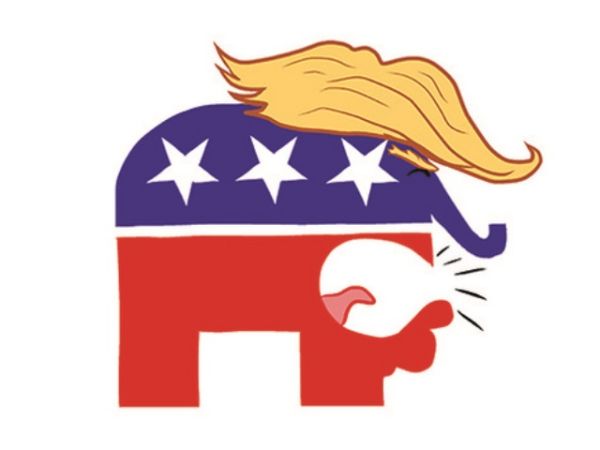
Illustration from 环球人物 Global People.
About 120 million Americans voted. Hillary Clinton received about 240,000 more votes than Donald Trump. But as many around the world are surprised to learn, the U.S. election is really 51 separate contests with each state's election carried out according to its own procedures and supervised by its own personnel. In most states and the District of Columbia, electoral college votes are awarded on a winner take all basis. Trump won at least 31 of those contests, taking at least 290 of the available 538 electoral college votes.(In Michigan, Trump has a slight lead and in New Hampshire, Clinton has a slight lead. Their 20 combined electoral college votes won't change the outcome of the election.)
Few anticipated this outcome. For example, the last pre-election day analysis by the Associated Press expected Clinton to win fairly easily, with at least 274 electoral college votes and probably well over 300. What pollsters and analysts seem to have missed was the intensity of Trump's support. Though Clinton outspent Trump in advertising($376 million to $90 million as of Nov. 5)and in building a get-out-the-vote machine, a larger share of Trump's supporters went to vote and seem to have encouraged like-minded friends and neighbors to do so as well. This seems to have especially been the case in rust belt states and in places such as Florida and North Carolina. Older white voters were key to Trump's success, even though they make up a shrinking share of the total electorate. Voters over 45 favored Trump by 53% to 45%. Millennials(age 18 to 35)favored Clinton by an even larger margin, but the vast majority of America's 69 million millennial citizens did not vote.(Click here for our #MillennialMinds conference.)
The ugliness of this campaign and the profound "unfavorability" ratings of Clinton and Trump were highlighted in China's state-led media, which used it and
|
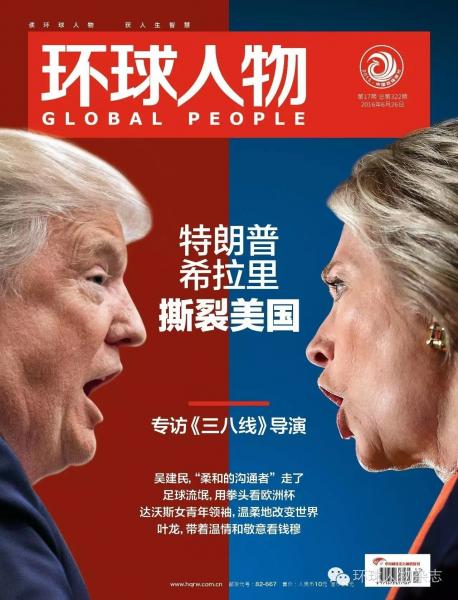
|
|
Cover of Global People, a People's Daily publication. |
Trump's lack of previous government experience as reasons why democracy is not suited for China. Earlier government-funded videos have celebrated China's "meritocratic" system highlighting Xi Jinping's rise from a county-level post to General Secretary of the Communist Party. That video neglects to mention that Xi's father joined the Party in 1928, was a close ally of Mao's for decades, and was entrusted by Deng Xiaoping with overseeing the first special economic zone in Shenzhen. State media, however, has repeatedly suggested that Trump's business pragmatism will cause him to find ways to collaborate for the mutual benefit of the two countries. In reporting Xi's first post-election conversation with Trump, state media noted Xi said there was "huge potential" in cooperation. Trump's office said the two "established a clear sense of mutual respect for one another."
Policy Options
Trump doesn't have an especially strong mandate. In this election, only about 26% of the eligible electorate actually bothered to vote for Trump(and a like amount for Clinton). Nearly three out of four eligible voters chose someone else or didn't vote. Since the election, he's said he will focus on immigration, healthcare, and jobs. While some Trump projects have been funded through Chinese investors purchasing EB-5 visas, it is his proposal to create jobs through big investments in infrastructure construction that might be important to the U.S.-China relationship.
The president-elect has said that American transportation systems, ports, and other facilities all need rebuilding and upgrading. He has noted that capital is cheap and some of his family's projects have been funded with wealthy Chinese purchasing EB-5 investment visas. Perhaps there might also be a need for Chinese high-speed rail expertise. Chinese firms(and Japanese)have met with California officials in the past about this. In any event, the Trump infrastructure economic stimulus effort, if it happens(there may be push back from deficit hawks in Congress), would echo what both the United States and China sought to do at the outset of the Global Financial Crisis eight years ago. China put far more into its effort, both through direct budgetary allocation and in ordering state banks to increase lending(up 400%, one reason why China's corporate debt is now so high), mostly to state-owned firms. As a result of this, China escaped the worst of the downturn(and its strength was a boon to its trading partners, including Japan, Taiwan, and Southeast Asia). Now, though, some analysts worry that China's relatively large debt burden cloud its economic prospects.
Jonathan Rothwell, a presenter at our recent China Card conference drew on Gallup and other data to profile those who declared themselves Trump supporters. Victor Yuan looked at Chinese perceptions of the candidates and of America. Other presentations at the conference examined the state of the U.S.-China relationship and discussed policy options available to the new administration. The range of issues discussed included economics, security, human rights, environment, global governance, and third-party matters. You can see these presentations at:http://china.usc.edu/video-the-china-card-conference-politics-vs-policy
Trump on China
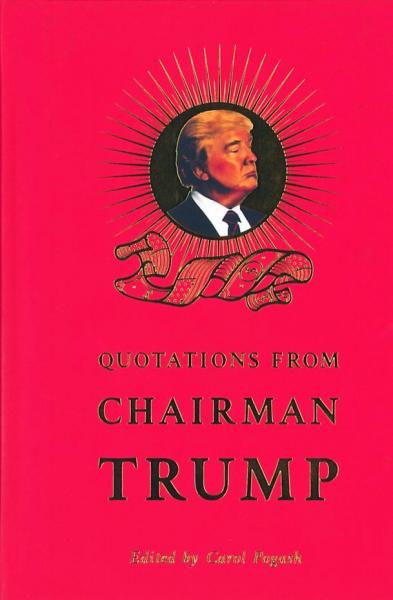
Of course China was a sometimes hot topic on the campaign trail in the Trump-Clinton debates. He argued China was "stealing our jobs; they're beating us in everything; they're winning, we're losing." In September and October, we gathered Trump and Clinton's China-related debate charges and pledges together along with those made in presidential debates going back to 1960. Click here to read those.
In the platforms they develop for each presidential race, political parties outline their priorities and the policies they intend to implement. Since the parties are not invented anew each four years, many of their core positions go relatively unchanged from year to year. In the Republican Party platforms excerpted here, there is considerable continuity, particularly in arguing for stability in the Taiwan strait and in stating flatly that if China were to unilaterally upset the status quo and use force against Taiwan, the U.S. would aid Taiwan under the Taiwan Relations Act(1979). In these documents, the Republican Party emphasizes its interest in trade with China and collaboration when possible, but the Party also insists that American interests are harmed by Chinese currency manipulation, theft of intellectual property, limits on access to the some parts of China's market and tolerance for nuclear weapons proliferation, particularly by North Korea. At various times, the Party will also condemn China's family planning program, restrictions on religious practice, and the treatment of Tibetans and other ethnic minorities. In recent platforms, the Republicans have noted China's military build-up and complained of China's actions in the South China Sea. In the most recent platform, adopted in July 2016, the Republican Party wrote that "China's behavior has negated the optimistic language of our last platform concerning our future relations with China." What followed was a pointed list of actions that the Party takes exception to, including a revival of Maoism. Ultimately, however, the Party calls for continued, but open-eyed, engagement with China, so that Chinese can see "how real democracy works." Click here to read China-centered excerpts from the Republican 2016 platform(and earlier platforms).
Personnel Choices
To the extent that Trump had a get out the vote effort, it was organized by the Republican National Committee headed by Reince Priebus. On Monday, Trump announced Priebus would be his Chief of Staff. Priebus is close to House Speaker Paul Ryan and has headed the RNC since 2010. Priebus has visited Taiwan several times, including last year when he met with President Ma Ying-jeou and then candidate and now President Tsai Ing-wen. In 2011, Priebus wrote that Chinese ownership of American debt was a problem because, "And at the end of the day, an economy that is controlled by China cannot possibly compete with China."
At the same time Priebus's appointment was announced, Stephen Bannon, CEO of Trump's campaign, was named Chief Strategist. Bannon, a former Naval officer, investment banker, and film financier, is best known for his leadership since 2012 of the combative conservative website Breitbart.com. A couple former Breitbart staffers left the company in 2016, complaining that Bannon had made it into a megaphone for Donald Trump. Former Breitbart spokesman Kurt Bardella told the Washington Post, "Breitbart will now go from being the propaganda arm of the Trump campaign to effectively becoming a state-run medium." Breitbart headlines on China are typical for the site:"China Meltdown Crushes World Economy"(Jan. 7), "China Smuggles in Vietnamese Child Brides"(April 29), "China Expands Influence in Pakistan by Flooding Markets with Knock Off Goods"(June 1), "China's 'Predatory' Devaluation Exporting Deflation"(July 13), "China to Citizens:Report Parents Who 'Lure' Kids into Religion,"(Oct. 15)and "Iran and China Agree to Joint Military Drills, Cooperate Against Terrorism"(Nov. 14).
On Monday, the Associated Press reported that former federal prosecutor and New York Mayor Rudolf Giuliani was Trump's likely choice as Secretary of State, edging out former Ambassador to the United Nations John Bolton and former Speaker of the House of Representatives Newt Gingrich. Giuliani was a fixture in Trump's campaign, but is not known for his foreign experience. Choosing him may reflect Trump's desire to focus its international efforts on defeating ISIS. Giuliani's views on China are not well known. He upset the Chinese government when he met with Taiwan's President Chen Shui-bian in New York in 2001. When China's President Jiang Zemin visited New York in 1997, neither Giuliani nor Republican Governor George Pataki met with him in order to convey opposition to China's human rights record.
The selection of Priebus as Chief of Staff has some in the Republican establishment hoping that Trump will pick two of their own for the key positions atop the Departments of State and Defense. They hope Trump will choose Tennessee Senator Bob Corker as Secretary of State. Corker is in his second term as Senator and was previously the mayor of Chattanooga. Before entering public service he ran a construction company. He has visited over 70 countries since joining the Senate Foreign Relations Committee in 2007. He became committee chair last year. The current Secretary of State, John Kerry, chaired the committee for four years before Barack Obama named him Secretary in 2013. Corker is known for his support of free trade. In 2011 he opposed efforts to sanction China for currency manipulation by putting tariffs on imports from China. His committee will oversee review of the U.S.-China Bilateral Investment Treaty if those negotiations ever produce an agreement. Corker has called for the U.S. Navy to increase its freedom of navigation operations in the South China Sea.
Among those reportedly being considered for Secretary of Defense is former Missouri Senator Jim Talent. He is currently in the midst of a two year term on the U.S.-China Economic and Security Commission. He served in the House of Representatives 1993-2001 and the Senate 2001-2007. He lost to Democrat Claire McCaskill and subsequently worked at the Heritage Foundation and has been on several Defense review committees. He was an advisor to Mitt Romney's in his 2008 and 2012 presidential campaigns. He advised Scott Walker during his brief campaign in 2015. He's written about the importance of the South China Sea, the rebalancing to Asia, and other issues. He's argued that much greater investment is needed in order to have a Navy capable of defending U.S. interests in the region. |
USC U.S.-China Institute, University of Southern California, 3502 Watt Way, ASC G24, Los Angeles, CA 90089-0281 |

















